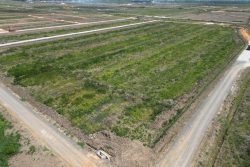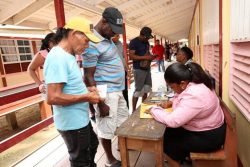The bountiful spread of fruit and vegetable ‘markets’ that manifest themselves across the country including evidence of a marked increase in the number of new vendors at various vantage points across the capital and in parts of other regions, is one of the many manifestations of the aggressive pursuit of entrepreneurial options arising out of the economic squeeze created by the onset of Covid-19. This development attests to the role that agriculture has played in our economic lives and that in times like these our fruit and vegetables loom even larger as a significant nutritional option.
Granted, the prevailing strictures arising out of the coronavirus pandemic places understandable restrictions on our ability to celebrate International Year of Fruits and Vegetables
(IYFV) in the manner that we should. There are, however, safe and creative ways in which we can go about doing so.
The testimonies of the farmers with whom the Stabroek Business has spoken over the past year or so, in terms of how their stepped up fruit and vegetable production have sustained their livelihoods in the course of the pandemic have served as a powerful reminder of the important role that fruit and vegetables play in both our economic and nutritional lives. We have covered some stories regarding the new linkages that have developed between rural farms, allowing for fruit and vegetables to continue to reach consumers in urban communities at reasonable prices. We have learnt, as well, of the fact that, to its considerable credit, the Guyana Marketing Corporation (GMC) has, in the face of the constraints inflicted by the pandemic, still managed to facilitate the export of fruit and vegetables to countries in the rest of the region and to a lesser extent, beyond. These developments, though they rarely if ever secure a mention in the local, regional or international media, underscore, nonetheless, the modest but important role that Guyana continues to play in the global response to the challenges that have arisen out of the onset of COVID-19.
Towards the end of 2020 the United Nations declared this year the International Year of Fruit and Vegetables, a pronouncement, the timeliness of which was manifested in the fact that it underscored the UN’s deliberate focus on agriculture and specifically on fruits and vegetables as a possible nutritional ‘weapon’ in the fight against Covid-19. Since then the Food & Agriculture Organization (FAO) acting as an agent of the UN has disseminated a plethora of information on IYFV and its significance placing particular emphasis on the role of fruits and vegetables in creating a more robust nutritional profile at a time when the health of the world is under serious threat.
That apart, IYFV is intended to create a global impetus for fruit and vegetables as part of the wider agricultural sector and to encourage national, regional and global emphasis on fruit and vegetable cultivation as, potentially, even more lucrative opportunities for farming communities. There are significant opportunities here for Guyana’s agricultural sector.
Almost three months into 2021 and while there is evidence that particular types of fruit and vegetables have become more prominent on the national diet profile, there is still no sign of a high-profile official plan for the execution of a national programme to mark IYFV.
Setting aside the opportunity which IYFV affords to seek to expand both the local and external market for fruit and vegetables, it also creates an opening not just from shining a spotlight on our fruit and vegetable farmers but also for the planning and execution of a year-long ‘curriculum’ that seeks to raise the levels of national consciousness insofar as the nutritional role of fruits and vegetables is concerned.
Here, there are spinoffs for our farmers, our export earnings and for our national nutritional profile. Raising the awareness of the importance of fruits and vegetables can create new and decidedly significant benefits for the country both in terms of the livelihoods of the farmers as well as, equally importantly, for the national disposition to fruit and vegetable consumption.
When account is taken of just how much both the nutritional profile and the economic well-being of the farmers and the country as a whole can be derived from the rolling out and effective execution of a national IYFV programme, there is no excuse for Guyana’s to do. We are, after all, moving towards the end of the first quarter of 2021.







